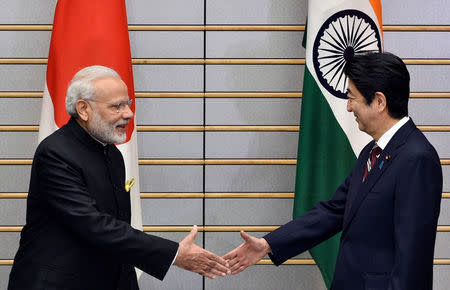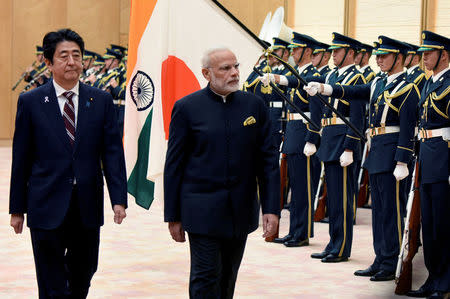Japan to supply India with nuclear power equipment, technology
By Kiyoshi Takenaka and Elaine Lies TOKYO (Reuters) - Japan and India signed a civilian nuclear accord on Friday, opening the door for Tokyo to supply New Delhi with fuel, equipment and technology for nuclear power production, as India looks to atomic energy to sustain its rapid economic growth. It was the first time Japan, the only country to have suffered a nuclear attack, had concluded such a pact with a country that is not a signatory to the Nuclear Non-proliferation Treaty (NPT). "Today's signing ... marks a historic step in our engagement to build a clean energy partnership," Indian Prime Minister Narendra Modi told a joint news conference with his Japanese counterpart Shinzo Abe. The accord stipulates that the nuclear fuel and equipment provided can only be used for peaceful purposes, and a separate document signed in parallel has a clause allowing Japan to terminate the pact if India conducts a nuclear test. "As a sole nation to have been nuclear-bombed, we bear the responsibility for leading the international community towards the realisation of a world without nuclear weapons," Abe told the same news conference. "The agreement is a legal framework to ensure that India will act responsibly for the peaceful uses of nuclear energy. It will also lead us to having India participate practically in the international non-proliferation regime." India says the NPT is discriminatory and that it has concerns about its two nuclear-armed neighbours, China and Pakistan. India is already in advanced negotiations to have U.S.-based Westinghouse Electric, owned by Japan's Toshiba Corp, build six nuclear reactors in southern India, part of New Delhi's plan to ramp up nuclear capacity more than 10 times by 2032. Japanese nuclear plant makers such as Toshiba and Mitsubishi Heavy Industries Ltd are desperate to expand their business overseas as the 2011 Fukushima nuclear disaster chilled domestic demand for new nuclear plants. The agreement with Japan follows a similar one with the United States in 2008, which gave India access to nuclear technology after decades of isolation. That step was seen as the first big move to build India into a regional counterweight to China. On India's infrastructure development, Abe said that construction of a high-speed railway connecting Mumbai and Ahmedabad, which will be based on Japan's "Shinkansen" bullet train technology, was scheduled to start in 2018, with commercial operation slated for 2023. "In Japan, the era of high economic growth began when Shinkansen started its service in 1964. I hope the advent of high-speed railway will trigger fresh economic growth in India as well," Abe said. Modi earlier on Friday praised the "growing convergence" of views between his nation and Japan, saying strong ties would enable them to play a stabilising role in Asia and the world. (Editing by Nick Macfie and Kevin Liffey)

 Yahoo Finance
Yahoo Finance 


